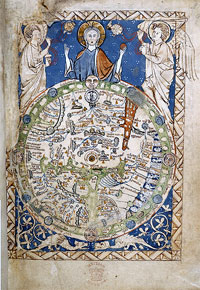Getting Started with Estate Planning
Over the past few years, I've done a reasonable job getting on top of my personal finances. I've paid off credit cards. I've put systems in place to track and analyze my spending each month. My files are in order. I've learned how to communicate about money with my spouse. On any given day, my financial life is running pretty smoothly.
 Looking ahead, though, is like looking off the edge of a medieval map: “Here Be Dragons!” I have an underfunded retirement account, no will, no one named as a guardian for my kids, and no clear plan for what happens to my stuff when I'm gone.
Looking ahead, though, is like looking off the edge of a medieval map: “Here Be Dragons!” I have an underfunded retirement account, no will, no one named as a guardian for my kids, and no clear plan for what happens to my stuff when I'm gone.
I'm not unusual in this. Few people in their 30s have made appropriate arrangements for their estates after they're gone. End-of-life issues seem infinitely in the future, something even my parents aren't really paying attention to yet.
The fact is, we all should be. Estate planning matters at any age, as soon as you have assets to leave behind and people to leave them to. Not only does planning your estate protect your family should disaster befall you, but it helps you get better clarity about your financial goals in the here and now.
How To Start
Like many personal finance topics, I found my own ignorance to be a huge gating issue to getting started on estate planning. I vaguely knew I should have a will, but I don't really know what else goes into planning an estate. All of it seemed to require time, money, and attention I don't really have to spare. I wasn't even sure where to start. So I didn't start. I just let it go undone.
To get a grasp of the basics, I brushed up on them at CNN's money site. This article gave me a decent sense of what steps to take for planning my estate. At the core, there seem to be four main areas of estate planning:
- Making decisions about your estate. This includes naming heirs for any assets you leave behind as well as naming a guardian for any minor children and making some provisions for how you want your assets distributed.
- Creating documents to record and enforce those decisions.
- Organizing your documents so that your family can find them and make sense of them.
- Communicating your intentions to your loved ones.
Decision Making
You probably have a good idea of the basics of your estate plan. If you have life insurance, you've named a beneficiary for the policy. You know who will get the bulk of your assets in the event of your death, and who you list as next-of-kin or an emergency contact on your health forms. A good estate plan requires you to get clear and specific about these things. You'll need to answer (at a minimum) the following questions:
- Who will inherit your assets?
- Do you have any specific gifts or bequests you want to make? You may, for instance, want to leave your assets primarily to your children, but bequeath your book collection to the local library and your vintage camera to your nephew, the family photographer.
- If you have minor children, who would you like to have raise them should both parents die or become incapacitated?
- Who will care for you and make decisions for you if you become incapacitated by illness or injury?
Documentation
The primary financial document you need to create is a will. If you don't have a large estate (by which I mean less than the 3.5 million dollars that would put you on the hook for estate taxes), you should be able to use a simple, self-made will. Hiring a lawyer for this is unlikely to be necessary. Nolo.com recommends using either their software or Quicken's Willmaker for creating your own basic will.
Your will should cover the disposition of your assets, name a guardian for your kids, name someone to manage property you leave to your kids, and name the executor of your estate. The executor is the person with the authority to see that your will is enforced.
In addition to a will, you may want to create a living will or advance medical directive. These are documents that let your doctors and caregivers know your wishes regarding medical care in the event of a major medical event where you may be unable to make your wishes known. To give your living will more power, you may also wish to assign medical power of attorney to your spouse or another loved one. Having someone acting on your behalf can help ensure that your wishes are followed.
You should consider creating a power of attorney for someone who can take over your financial affairs if you are alive but unable to manage them. You can assign someone either “durable power of attorney” or “springing power of attorney”. The former is automatically in place. The latter requires a court hearing to prove that you are not competent to handle your own affairs. A lawyer can help you decide which is right for you.
Finally, consider writing a “digital will”. This is a document that identifies all your online accounts at sites like Facebook, Flickr, and Myspace, and gives your family instructions about what you want done with them. It should include all relevant usernames and passwords. While not a legally binding document, this can be an invaluable tool for your loved ones to gain access to your social media accounts and manage them in the way you desire.
Organization
Once you've created these documents, you want to keep them organized in a simple, clear place where your family can easily access them should they need to. That could be in your file cabinet, with your attorney, in a safe deposit box. Wherever you do it, you should also make sure your heirs will have simple, organized access to your financial records and accounts, and any other important papers.
For most of us, these records aren't just on paper anymore. Not only do I need to be sure my estate executor has access to my bank account numbers and 401K accounts; I probably want that person to be able to access those accounts online, too. They'll need to get into my computer, and be able to access my Google documents and Mint account if they're going to really make sense of my finances. You'll want to include any necessary banking usernames and passwords with your important papers, along with your digital will.
Communication
When you've created your estate plan, tell your family about it. Be certain the person you picked to be guardian for your kids is willing to do it. Make sure your executor knows where you keep your will and other important papers. Let your heirs know what to expect from your will. All this will cut down on confusion and conflict after your death.
As you can see, doing all this requires having your financial and personal affairs in order. That effort will serve you well in your lifetime, as well as being a boon to your heirs when you're gone.
Become A Money Boss And Join 15,000 Others
Subscribe to the GRS Insider (FREE) and we’ll give you a copy of the Money Boss Manifesto (also FREE)

